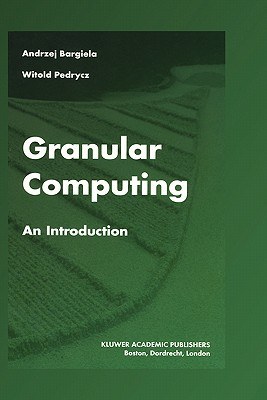Granular Computing
豆瓣
Bargiela, Andrzej, Pedrycz, Witold
简介
This book is about Granular Computing (GC) - an emerging conceptual and of information processing. As the name suggests, GC concerns computing paradigm processing of complex information entities - information granules. In essence, information granules arise in the process of abstraction of data and derivation of knowledge from information. Information granules are everywhere. We commonly use granules of time (seconds, months, years). We granulate images; millions of pixels manipulated individually by computers appear to us as granules representing physical objects. In natural language, we operate on the basis of word-granules that become crucial entities used to realize interaction and communication between humans. Intuitively, we sense that information granules are at the heart of all our perceptual activities. In the past, several formal frameworks and tools, geared for processing specific information granules, have been proposed. Interval analysis, rough sets, fuzzy sets have all played important role in knowledge representation and processing. Subsequently, information granulation and information granules arose in numerous application domains. Well-known ideas of rule-based systems dwell inherently on information granules. Qualitative modeling, being one of the leading threads of AI, operates on a level of information granules. Multi-tier architectures and hierarchical systems (such as those encountered in control engineering), planning and scheduling systems all exploit information granularity. We also utilize information granules when it comes to functionality granulation, reusability of information and efficient ways of developing underlying information infrastructures.
contents
Granular Computing as an Emerging Paradigm of Information Processing
Bargiela, Andrzej (et al.)
Pages 1-18
Sets and Intervals
Bargiela, Andrzej (et al.)
Pages 19-46
Fuzzy Sets
Bargiela, Andrzej (et al.)
Pages 47-79
Rough Sets
Bargiela, Andrzej (et al.)
Pages 81-97
Generalizations of Information Granules
Bargiela, Andrzej (et al.)
Pages 99-124
From Numbers to Information Granules
Bargiela, Andrzej (et al.)
Pages 125-160
Recursive Information Granulation
Bargiela, Andrzej (et al.)
Pages 161-192
Granular Prototyping in Fuzzy Clustering
Bargiela, Andrzej (et al.)
Pages 193-215
Logic-Based Fuzzy Clustering
Bargiela, Andrzej (et al.)
Pages 217-233
Semantical Stability of Information Granules
Bargiela, Andrzej (et al.)
Pages 235-254
Communications Between Granular Worlds: Fundamentals
Bargiela, Andrzej (et al.)
Pages 255-265
Networking of Granular Worlds: Collaborative Clustering
Bargiela, Andrzej (et al.)
Pages 267-299
Directional Models of Granular Communication
Bargiela, Andrzej (et al.)
Pages 301-322
Intelligent Agents and Granular Worlds
Bargiela, Andrzej (et al.)
Pages 323-348
Self-Organizing Maps in the Design and Processing of Granular Information
Bargiela, Andrzej (et al.)
Pages 349-376
Temporal Granulation and Signal Analysis
Bargiela, Andrzej (et al.)
Pages 377-397
Granular Data Compression
Bargiela, Andrzej (et al.)
Pages 399-416
Interval State Estimation in Systems Modelling
Bargiela, Andrzej (et al.)
Pages 417-446
Epilogue
Bargiela, Andrzej (et al.)
Pages 447-447